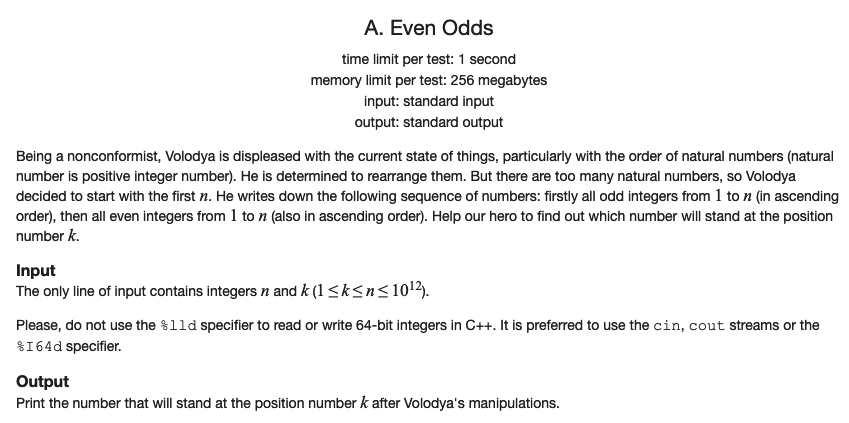Even Odds
October 3, 2023 · 748 words · 4 min
Evening the odds?
Introduction
Problem Statement

So basically, we are finding what number will be at a certain position in a set
of numbers. The set of numbers consists of (in order) all of the odd numbers up
to a specified number, followed by all of the even numbers up to the specified
number.
 In this example if we lay out the ordered set we get something like:
In this example if we lay out the ordered set we get something like:
{1, 3, 5, 7, 9, 2, 4, 6, 8, 10}
The third place in this set is the number 5, so 5 is the answer.
Concept
We can solve this mathematically, we just need to keep in mind of a couple of properties.
There are either 2 sets:
- One where half the numbers are odd or even.
- One where there are more odds than evens.
We can find the point in the set where we reach the end of the odd numbers. From there, if the position we are looking for is below this point, we can compute the appropriate odd number that should be at that position.
It’s a similar process for when the position is above the point. We would then compute the appropriate even number.
Implementation
We can start off with handling the input
use std::io::stdin;
fn main() -> Result<(), String> {
let mut buffer = String::new();
let _ = stdin().read_line(&mut buffer);
Ok(())
}
We then have to parse the first line of input, this line gives us the length of the set and the position to look up when we are done.
let input: Vec<u64> = buffer.trim()
.split(" ")
.map(|x| x.parse::<u64>().unwrap())
.collect();
Here we are chaining methods together.
Trim(): Strip off the newline character from the buffer
Split(): Creates an iterator from splitting the string by whitespace.
Map(): We can consume the previous iterator and create another iterator whose elements are the numbers parsed from the input.
Collect(): We can then consume the iterator and create a Vector out of it.
We can now start implementing the logic of our program. First, we should find the point in the set where the “odds” stop and the “evens” begin.
let mut half = 0;
if input[0] % 2 != 0 {
half = (input[0] / 2) + 1;
} else {
half = input[0] / 2;
}
Here we create a conditional where if the length of the set is odd, we perform an integer division by 2 and add 1. This will give us the point where the odds stop.
An example:
{1, 3, 5, 2, 4} is 5 elements long.
5 / 2 = Position 2 (3).
Position 2 + 1 = Last odd number (5)
If the length of the set is even, the point where the odds stop will be at exactly half of the length of the set.
An example:
{1, 3, 2, 4} is 4 elements long.
4 / 2 = Position 2 (3).
Position 2 is the last odd number.
Now we can move on to actually calculating the number at the position.
let mut current: u64 = 0;
if input[1] <= half {
current = 1;
current += (input[1] - 1) * 2;
} else {
current = 0;
current += (input[1] - half) * 2;
}
In the first conditional, we check to see if the position is less than or equal to half (which is the point where the odd numbers stop). If this is true, since the first odd number is 1, we update the ‘current’ variable accordingly. We then take the position and subtract it by 1 before multiplying by 2. We add the result of that to our current variable
If the position is greater than half, we can subtract the position by half and multipy by 2 to get the correct number.
And after that, all we have to do is print the current variable and we can complete the challenge. Here is the full solution.
Full Code Solution
use std::io::stdin;
fn main() -> Result<(), String> {
let mut buffer = String::new();
let _ = stdin().read_line(&mut buffer);
let input: Vec<u64> = buffer.trim()
.split(" ")
.map(|x| x.parse::<u64>().unwrap())
.collect();
let mut half = 0;
if input[0] % 2 != 0 {
half = (input[0] / 2) + 1;
} else {
half = input[0] / 2;
}
let mut current: u64 = 0;
if input[1] <= half {
current = 1;
current += (input[1] - 1) * 2;
} else {
current = 0;
current += (input[1] - half) * 2;
}
println!("{current}");
Ok(())
}